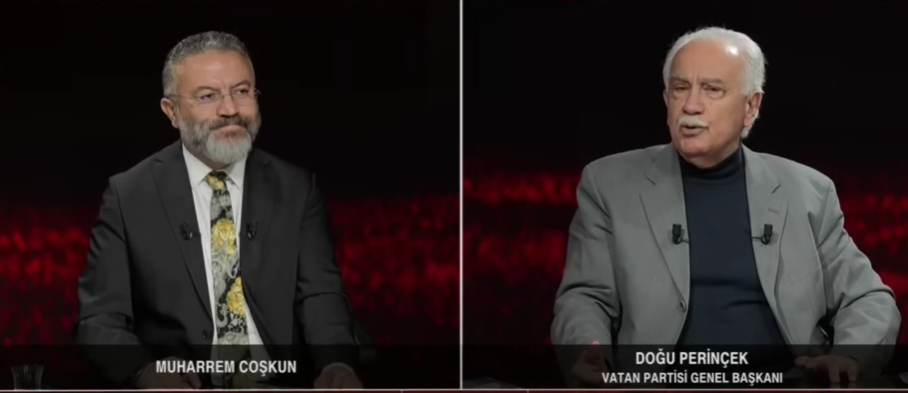Turkey’s National Intelligence Organization (MİT) established the now-outlawed Kurdistan Workers’ Party (PKK) to neutralize leftist revolutionary groups in the country, claimed Doğu Perinçek, leader of the neo-nationalist Patriotic Party, during a live broadcast on Nov. 9 in remarks that went viral on social media on Wednesday.
Speaking on a broadcast of the pro-government Akit TV, Perinçek reiterated longstanding allegations that the PKK, a Kurdish militant group that has waged an armed insurgency against the Turkish state since 1984, resulting in the deaths of more than 40,000 people, and was labeled a terrorist organization by Turkey, the United States and the European Union, was founded under the direction of Turkish intelligence.
“I’m saying it very clearly: MİT founded the PKK,” Perinçek said. “They created it based on the ‘insect-eating insect theory.’” He explained the theory as a strategy to pit one militant group against others to eliminate perceived threats.
According to Perinçek, the PKK’s establishment in the late 1970s was part of a deliberate effort to dismantle leftist revolutionary groups operating in southeastern Turkey. He further alleged that the PKK initially targeted leftist organizations and his own party at the time, which was a self-proclaimed Maoist group active in the region.
“They killed five of our leaders, including our heads in Gaziantep, Kahramanmaraş and Pazarcık,” he said.
Perinçek’s remarks follow years of debate and conspiracy theories regarding the PKK’s origins. Some commentators and researchers have argued that MİT played a role in infiltrating Kurdish nationalist movements during the 1960s and 1970s, seeking to control and divide them to prevent the rise of a cohesive opposition. Critics contend this strategy backfired, as the PKK evolved into an independent force that launched an armed insurgency against the Turkish state, leading to decades of bloody conflict.
The PKK, ostensibly founded by Abdullah Öcalan as a Marxist-Leninist group advocating for Kurdish independence, has shifted its goals over time. Today, it calls for greater autonomy for Kurds within Turkey, rather than an independent Kurdish state. However, the group remains a focus of Turkish military operations and at the center of international diplomatic disputes, particularly over its Syrian affiliate, the Democratic Union Party (PYD).
Perinçek’s assertions reflect a controversial perspective in Turkish political discourse. The neo-nationalist leader has frequently criticized the PKK and Kurdish political movements, aligning with the Turkish government’s hardline stance. His comments also revive broader suspicions about MİT’s historical role in manipulating political and ethnic conflicts within Turkey and the emergence of the PKK.
The allegations also echo theories proposed by other analysts and former insiders who have accused Öcalan of complicity in deals with the Turkish state. Some critics argue that his imprisonment since 1999 may have been the result of secret agreements to preserve his life in exchange for influencing the PKK’s activities. Öcalan has consistently denied such claims.
Perinçek’s assertions emerge in a period of intensified discourse concerning the incarcerated leader of the PKK.
In October 2024, Devlet Bahçeli, chairman of the Nationalist Movement Party (MHP) and a staunch ally of the Turkish President Recep Tayyip Erdoğan, proposed that Öcalan be permitted to address Parliament during the pro-Kurdish Peoples’ Equality and Democracy Party (DEM Party) parliamentary group meeting to declare the dissolution of the PKK and the cessation of its activities.
Bahçeli stated, “If the terrorist leader’s isolation is lifted, let him come to [Parliament], speak at the DEM Party group meeting, and announce that terrorism has ended and the organization has been disbanded.”
He also mentioned “right to hope,” a term used to describe a prisoner’s right to hope for a better future, often discussed in terms of chances of parole for those serving a life term of imprisonment.
Öcalan has been imprisoned since his capture in February 1999. Initially sentenced to death, his sentence was commuted to life imprisonment in 2002 following Turkey’s abolition of the death penalty. He has been held in solitary confinement on İmralı Island, located in the Sea of Marmara, where he was the sole inmate for a decade.
As of November 2024, Öcalan has been incarcerated for over 25 years. If Parliament amends the law to make parole a possibility for those serving a life sentence, the PKK leader might be eligible for parole.
Perinçek criticized Bahçeli’s remarks regarding Öcalan, arguing that such a move would legitimize the PKK and weaken Turkish government.
Perinçek stated that the suggestion contradicts Turkish laws and the Constitution by granting “a terrorist leader” such a platform as the opportunity to speak in Parliament. He further argued that Bahçeli’s proposal ultimately benefits foreign powers like the United States and Israel by destabilizing the Turkish government.
Perinçek called for a tougher stance against the PKK, emphasizing the importance of military operations and rejecting the idea of negotiating with the group. He suggested that such concessions to Öcalan could demoralize nationalist voters and create divisions that would ultimately serve the interests of adversarial foreign forces.
